More Great Content:
↓ Continue Reading To See This Amazing Video
It’s uncommon to consider birds as pests. Yet, certain bird species infestations can be hazardous to human beings and the destruction they do can be highly expensive.
Bird nests can harm roofs and eaves, and their waste poses a health risk and corrodes metal and pavers. Ticks, fleas, and other parasites that can bite people and cause a variety of health issues can be carried by birds.
Whether you’re having turkeys invade your yard or robins build nests in your attic, we’ve found the smells that will send these birds flying! Read on to learn all about the smells that birds hate.
Common Types of Birds
Depending on where you live, there may be a plethora of bird species in your area. Many people can spot a cardinal or blue jay just about any day of the week! Here are four birds known for being pesky in and around residential areas.
Pigeons
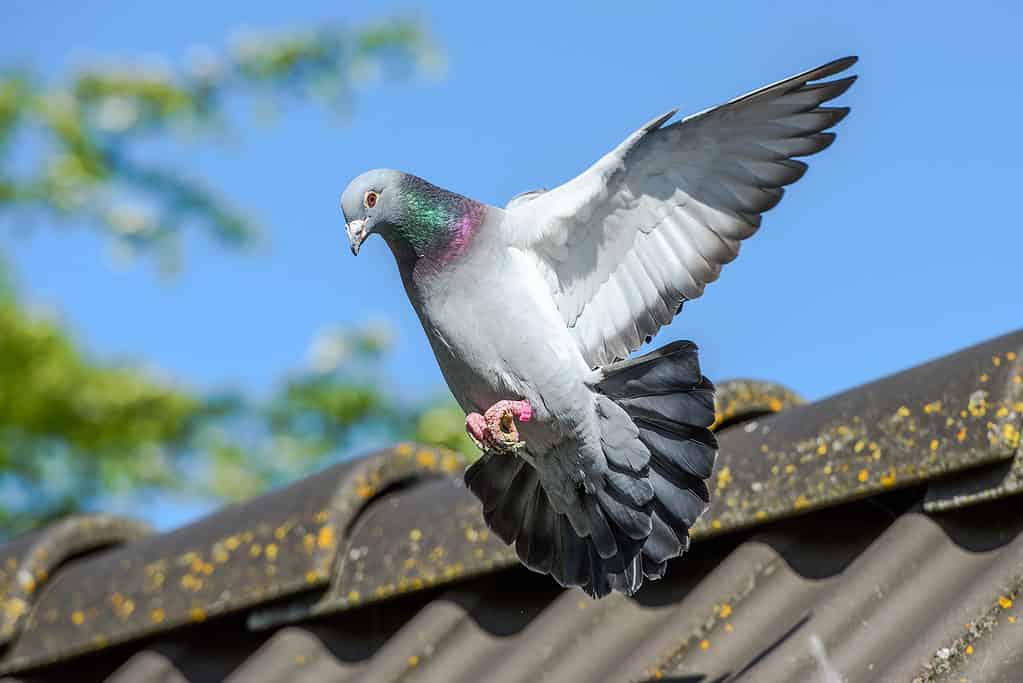
©iStock.com/Frank Cornelissen
We are all too familiar with pigeons’ irritating behaviors. The majority of us have a basic understanding of where pigeons like to feed and roost, but we don’t know much about how or where they nest.
The main criterion for a nest site for domestic pigeons is that it be level and shielded from wind and precipitation. A typical nesting location would be a covered section of the roof, balcony, windowsill, or overhang.
Pigeon nests can also be built on trim moldings, on rafters, under overpasses, in attics, steeples, gutters, or under eaves. But, nests aren’t always high. An abandoned building’s ground level can have a corner that would make a good location.
Robins
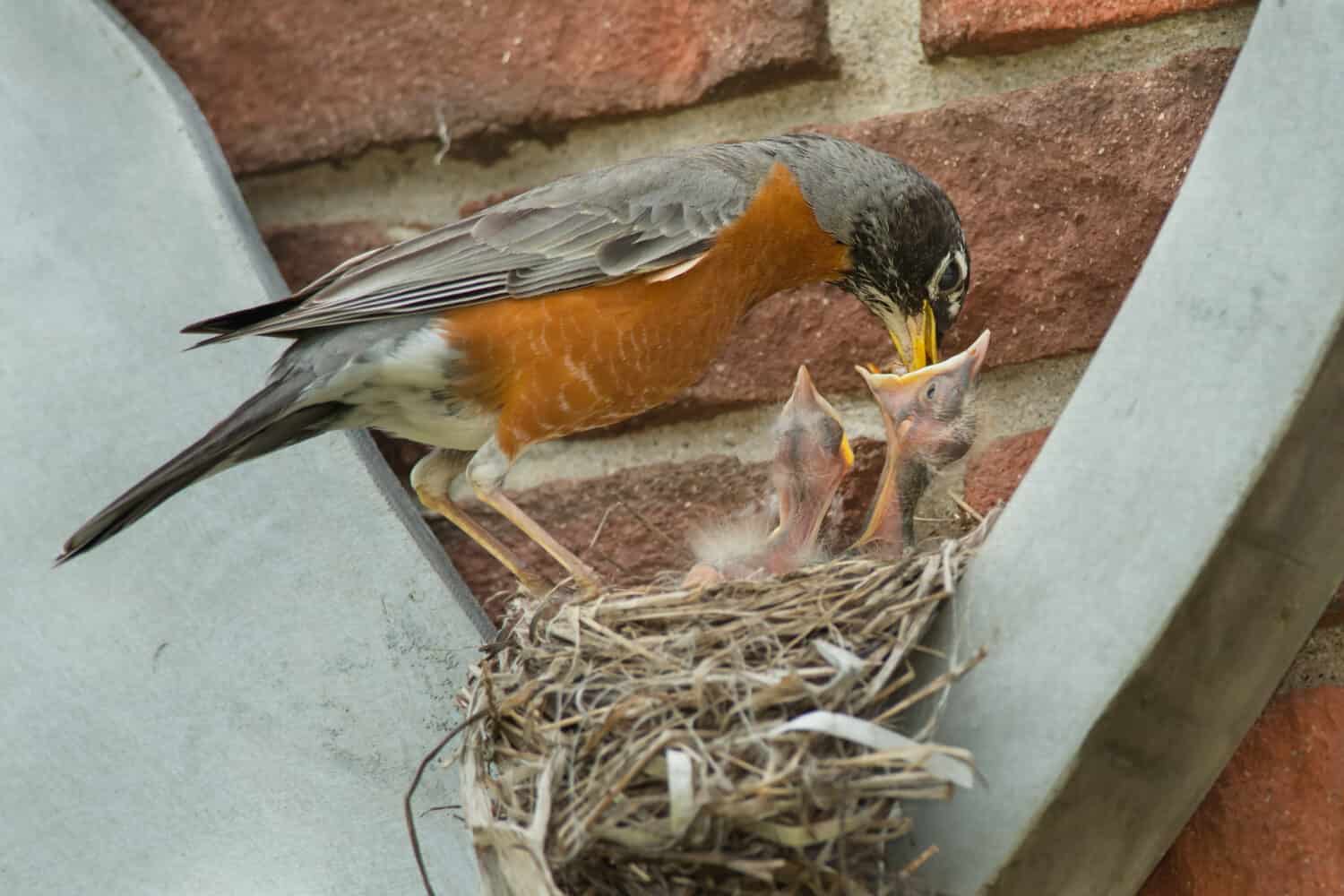
©Paul Reeves Photography/Shutterstock.com
The American Robin is a widespread bird on the continent. They can be found in more wild settings including woodlands, forests, lawns, meadows, and city parks.
The locations of the nests, which are normally on one or more horizontal branches buried in or just beneath a layer of dense foliage, are chosen by the female robins. Although they can be constructed as high as the treetop, nests are normally in the lower part of a tree.
American Robins will also build their nests in gutters, under eaves, on outdoor lighting, and on other buildings.
Turkeys
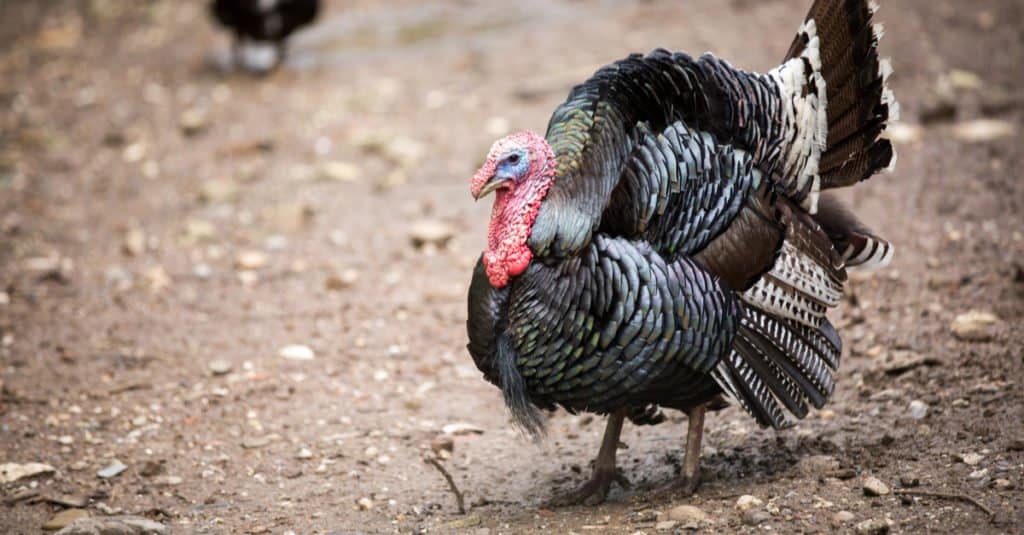
©Matthew Clemente/Shutterstock.com
Excrement from turkeys that roost in trees can contaminate the ground below. Also, the noise they make can bother people living close. On occasion, turkeys have scratched cars, shattering side view mirrors and damaging the paint.
Oak trees, pecans, dogwoods, huckleberries, raspberries, blueberries and other fruits found in the underbrush are also favorites of turkeys. These elements could entice the birds to visit your place.
Crows
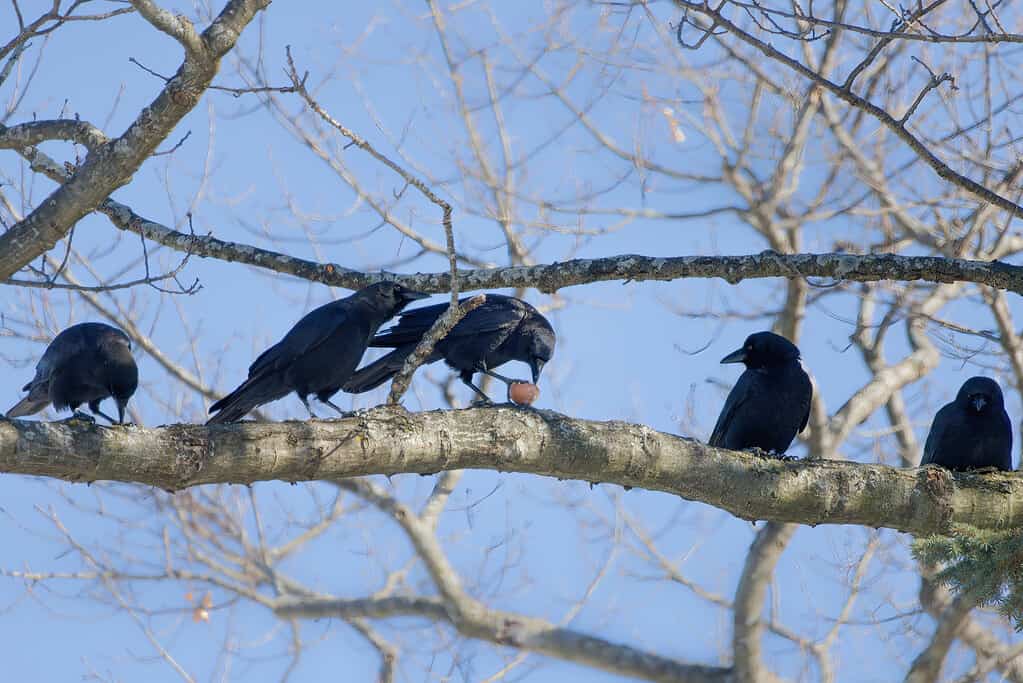
©iStock.com/Karel Bock
Crows will live in nearly any woodland, farming, orchard, or residential area as long as there is enough protection and trees appropriate for nesting. They appear to favor areas with low altitudes and moisture, such as lakeshores, creeks, and rivers.
Coniferous or deciduous trees that are taller than 15 feet are used to build the nests. When there aren’t any large trees nearby, nests could be built lower in bushes or hedgerows. Crows may build their nests on building walls or window ledges in metropolitan settings.
Old crow nests are home to hawks and owls, while tree squirrels and raccoons use them as perches for summertime naps.
How Do You Prevent a Bird Problem?
While some birds are stunning and enjoyable to observe, others can be plain obnoxious and destructive. Although birds aren’t often thought of as pests, they can become an issue if their nests block access to key areas of your home, they carry diseases that can be spread through their droppings, or they enter your attic or chimney.
The first step in reducing the number of bothersome birds is to know what attracts them. Ravens, pigeons, swallows, robins, and starlings, which are pest birds, are drawn to food sources in and around your house.
A typical nuisance bird, woodpeckers will bore into your trees in quest of insects that consume wood, such as carpenter ants and beetles.
How Birds Smell
For a while, it was thought that birds lacked the ability to smell. Further research, which demonstrated that birds can smell even if their sense of smell is not as evolved as their eyesight and hearing, disproved this notion.
To comprehend this, consider how huge olfactory air sacs in birds allow them to both breathe and inhale scents. Usually, where their beaks attach to their heads is where their nasal passages are placed. A cere is a group of bones that are coated in tissue. The term “nares” refers to the nostrils themselves.
Even though a bird’s sense of smell isn’t particularly developed, it is clear that some aromas are repulsive to them and others are quite alluring.
Many of the odors that birds find unpleasant are really irritants that cause discomfort for them. They are not harmful to birds and cause no harm to them at all.
Smells That Birds Hate
Thankfully, there are several different smells that birds hate. These unpopular scents will not only send birds packing but keep them from coming near your home in the first place! Use these smells inside and outside your home to keep the area bird-free!
Cayenne Pepper

©Thanatip S./Shutterstock.com
As you are probably already aware, cayenne pepper generally irritates the olfactory glands of most animals, even humans. Birds experience the same thing. The aroma of cayenne pepper bothers them and they don’t like it.
Making a spray by combining cayenne pepper in a reasonable amount with water and spraying it about areas where birds are not wanted is simple. Mist the cayenne pepper spray on fences, the yard’s perimeter, and the garage’s corners.
Using the cayenne pepper solution might irritate your eyes as well as discourage birds, so use caution.
Garlic
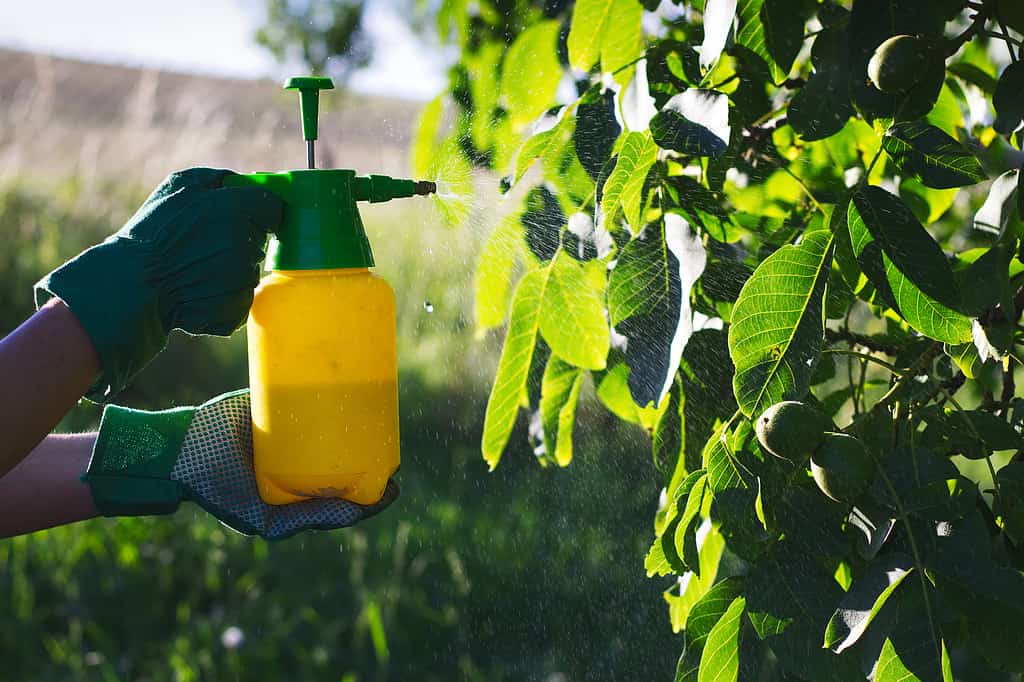
©iStock.com/Zbynek Pospisil
Due to the presence of allicin, a natural compound, garlic irritates birds. As a result, you can make a garlic spray to utilize around the locations where you don’t want birds to congregate and take advantage of this information.
Garlic spray is also helpful for keeping birds away from ripening fruit on trees. Birds find the fruit’s aroma to be highly alluring when it ripens. Birds will keep away if you sprinkle garlic to cover the smell of ripening fruit.
Vinegar
In its natural state, vinegar is very good at keeping birds away. Spray pure vinegar on potential nest-making places on your patio or garage to keep them out. Spray vinegar in specific parts of your garden and backyard to deter birds from visiting. But refrain from spraying vinegar directly on your plants.
Mix vinegar with squeezed lemon or crushed garlic for a more powerful agent. Apply the mixture to places on your property where birds regularly congregate by combining the ingredients in a spray bottle.
Peppermint
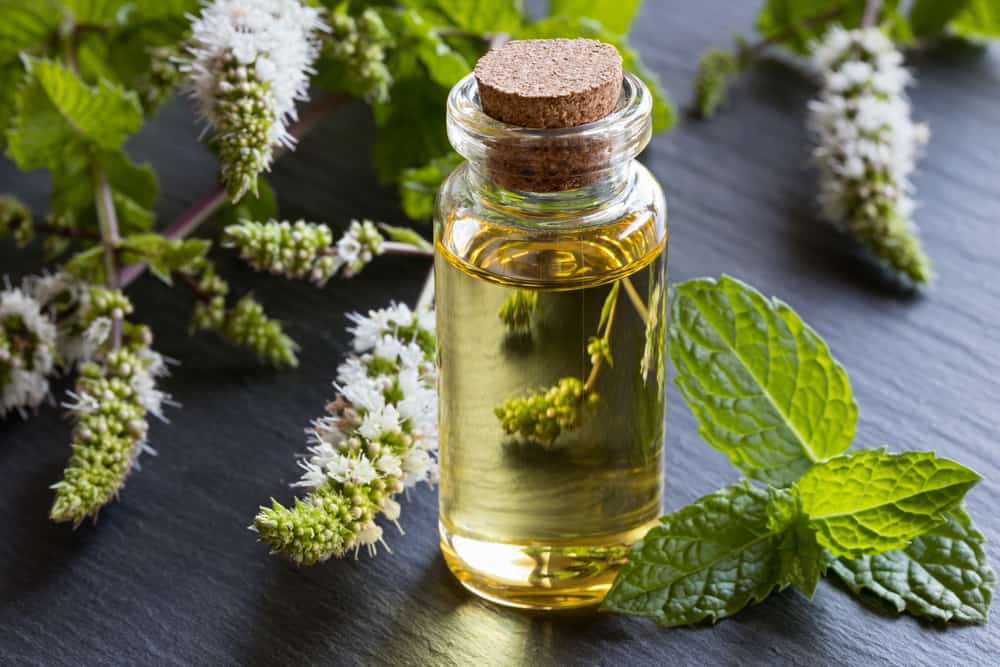
©Madeleine Steinbach/Shutterstock.com
Birds avoid regions that have been treated with peppermint because they find the fragrance to be particularly repulsive. You can make a spray that is safe to use on your plants while also deterring birds by combining water and 100% natural peppermint oil.
Any buildings that you want to preserve free of bird nests can be sprayed with pure peppermint oil, which will deter them.
Chili
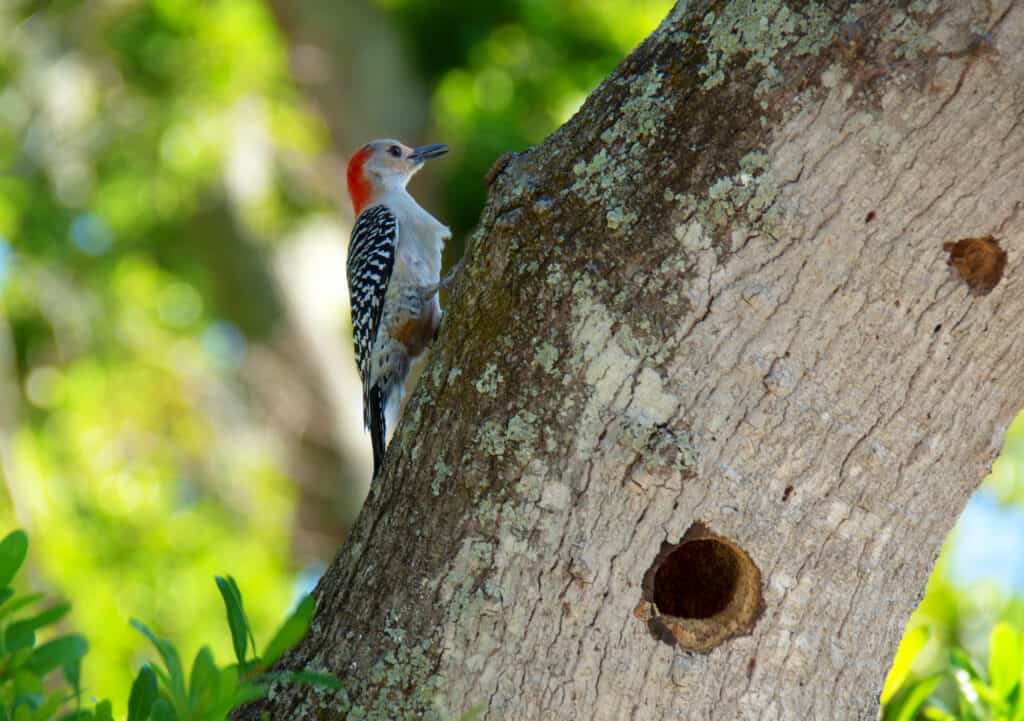
©Michael O’Keene/Shutterstock.com
One smell that deters woodpeckers and other bird species is chili. It can be found in a variety of forms, including chili pepper, chili powder, and salt. Moreover, any type of chili can aggravate the bird’s nasal passages. Vinegar and chili should be combined for the best benefits. Water will function just as well as vinegar in this situation.
Cinnamon
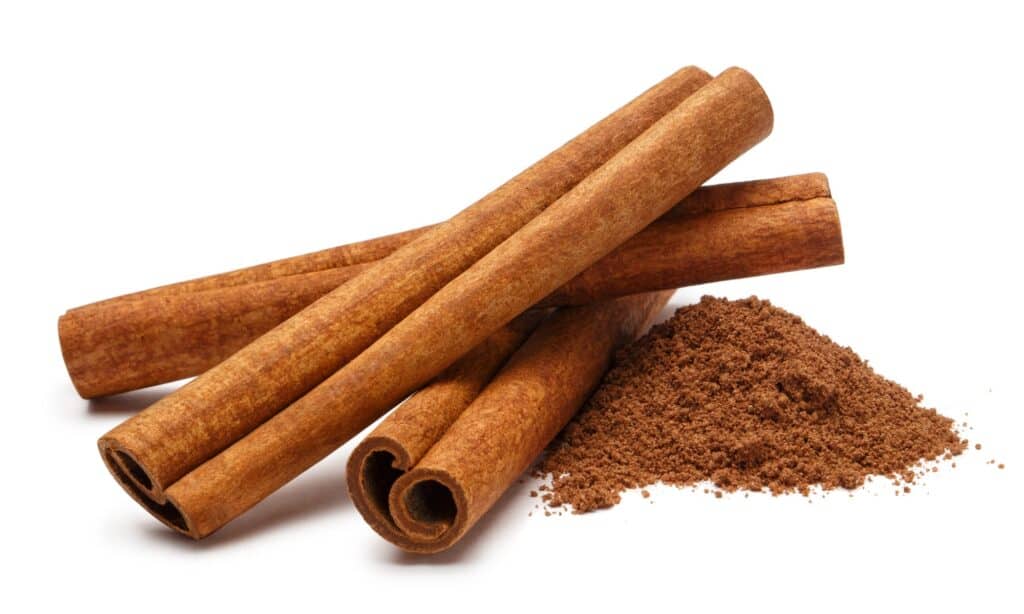
©iStock.com/Marat Musabirov
Although most people like cinnamon and most of us currently have cinnamon in the spice cabinet, birds don’t like the smell of it very much. The spicy, aromatic scent of cinnamon does not appeal to birds since most birds find it irritating.
In a spray bottle, combine one part cinnamon oil with three parts water. The mixture should be sprayed all around locations you want to keep birds away from. Trial and error will be necessary to achieve the ideal blend, but the aforementioned recipe is an excellent place to start.
Bird Gel
A fragrant bird gel will work for you if you’d rather buy anything pre-scented than make your own DIY bird repellent. These bird gels operate on a multisensory level, influencing the bird’s senses of touch, smell, and vision. Citronella, agar, and mint oils are among the fragrances that are employed and cause the birds to feel uneasy.
Final Thoughts
For your peace of mind, it is crucial to understand what smells irritate birds. You may rest easy knowing that your garden, backyard, and home are once again free from birds now that you have a better understanding of what you need to do to keep birds away from your house. Also, you can deter the birds without harming them.
Up Next:
"bird" - Google News
April 03, 2023 at 06:10PM
https://ift.tt/jEunhrz
Discover 7 Smells That Birds Absolutely Hate and Keep Them Away - AZ Animals
"bird" - Google News
https://ift.tt/sqPuYdJ
https://ift.tt/W5HKN2A
Bagikan Berita Ini
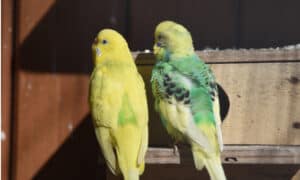














0 Response to "Discover 7 Smells That Birds Absolutely Hate and Keep Them Away - AZ Animals"
Post a Comment